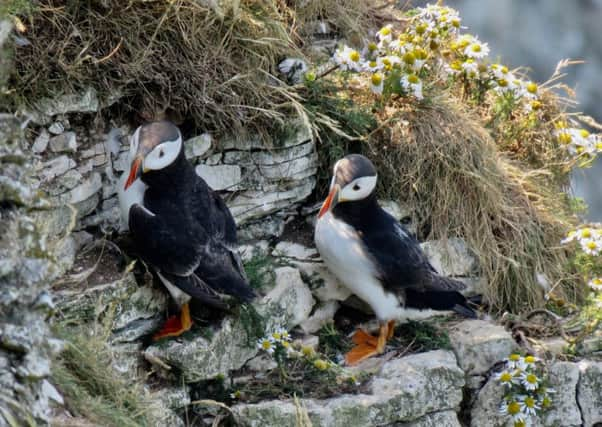Dr Therese Coffey: Seabirds and marine life need safe havens


We already know our underwater habitats are a treasure trove of biodiversity, but closer to shore, Yorkshire’s coast also plays host to England’s largest seabird colony. Every year, thousands of seabirds like gannets, kittiwake and razorbills migrate long distances from the other side of the world to breed and rear their young. Unless they are given a safe haven to do this, these much-loved birds face an uncertain future.
I visited Flamborough Head last year, and saw first-hand the importance of conserving such a dynamic natural site. It was with this in mind that the Government consulted with the area’s residents, organisations and businesses to extend vital protections for seabirds, stretching from Flamborough Head to Filey.
Advertisement
Hide AdAdvertisement
Hide AdI’m happy to confirm the area’s Special Protection Area (SPA) will now be extended by 7,600 hectares, providing a safe space for a quarter of a million breeding seabirds, including nearly 2,000 of our iconic puffins. To protect these birds, this site already has a number of local laws in place – including restrictions on trawling and rules around the location of fishing nets used.
These laws will cover the boundaries of the newly-extended SPA to make sure that these cherished birds are able to safely forage, feed and breed – protecting them for now and for generations to come.
Our commitment to helping marine life and seabirds to flourish does not stop here.
Further north of Yorkshire, Natural England, the Government’s adviser for the natural environment, is also proposing extending the Teesmouth and Cleveland Coast SPA by nearly 10,000 hectares – which, if designated, will help protect populations of breeding little terns and common terns.
Advertisement
Hide AdAdvertisement
Hide AdThese new protections add to the 45 SPAs already designated in English waters, which protect populations of rare and vulnerable seabirds from human activity – including fishing or outdoor recreation – and minimise disturbance to open water feeding areas.
I am passionate about celebrating and safeguarding the diverse range of habitats which grace the British coastline, and it’s clear to me that the public also care deeply about our oceans and sea life.
We recently consulted on plans to introduce 41 new Marine Conservation Zones (MCZs) to protect the array of marine life under our waters. We know there is a wave of public support for these proposals.
Our new Marine Conservation Zones will reach right the way along our coastline, safeguarding important marine habitats and marking the most significant expansion of the UK’s “Blue Belt” of protected areas to date.
Advertisement
Hide AdAdvertisement
Hide AdIn these areas, no new activities deemed damaging will be allowed, protecting species like the short snouted seahorse, stalked jellyfish and peacock’s tail seaweed – and allowing important habitats to recover over time.
Eleven kilometres off the Yorkshire coast, we proposed a new MCZ at Holderness Offshore, which spans more than 1,000 square kilometres. Living in this site are a wide range of seafloor- dwelling animals, such as worms, bivalves, starfish and crustaceans, alongside fish species like lemon sole and plaice.
If approved, this new tranche of Marine Conservation Zones will mean two-fifths of our coastline is protected.
Beyond this, we are taking action elsewhere to protect our oceans. Alongside expanding our Blue Belt, we have introduced one of the world’s strongest bans on microbeads and just last week we published new figures showing that since the 5p plastic bag charge was introduced in 2015, sales have fallen by a staggering 86 per cent.
Advertisement
Hide AdAdvertisement
Hide AdIn a further drive to clean up our seas, we have also set out ambitious plans to end the sale of plastic straws, stirrers and cotton buds and introduce a deposit return scheme for plastic bottles, subject to consultation later this year.
These are all important steps, but we have a long way to go in ensuring that our beautiful coasts and seas are protected now and for future generations.
Dr Thérèse Coffey is the Environment Minister.